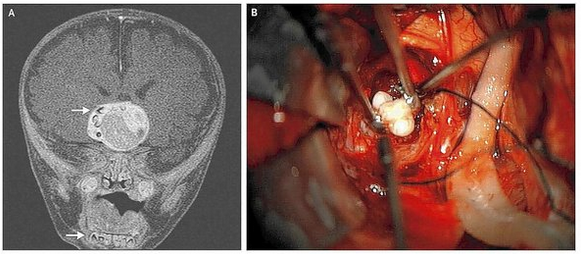A newly-born baby has survived a surgery needed for a rare brain tumor that contained human teeth.
 The tumor with teeth had formed in the middle of the brain of a 4-month-old from Maryland, according to reports. Doctors felt that the child’s head was abnormally large for his age, and a brain scan revealed a large mass called a craniopharyngioma— fortunately these kinds of tumors do not spread to other parts of the body.
The tumor with teeth had formed in the middle of the brain of a 4-month-old from Maryland, according to reports. Doctors felt that the child’s head was abnormally large for his age, and a brain scan revealed a large mass called a craniopharyngioma— fortunately these kinds of tumors do not spread to other parts of the body.
“It’s not every day you see teeth in any type of tumor in the brain. In a craniopharyngioma, it’s unheard of,” Dr. Narlin Beaty of University of Maryland Medical Center told LiveScience. He along Dr. Edward Ahn of Johns Hopkins Children’s Center performed the delicate surgery to save the child’s life.
As the Chicago Tribune reports:
The tumor was found in the then-4-month-old from West Virginia in 2012 after a pediatrician noticed that his head was unusually large for his age.
Doctors wrote about the findings in an article that appeared this week in the New England Journal of Medicine. The discovery could someday help researchers trying to cure diseases or grow new organs, medical experts said.
“It gives us more insight into the origins of the tumor,” said Dr. Edward Ahn, a pediatric neurosurgeon at Johns Hopkins who was the lead surgeon in the case.
The tumor found in the child was a craniopharyngioma, a rare mass found mostly in young children that can press up against the pituitary gland and optic nerve and cause pressure in the brain, according to the National Institutes of Health.
Only five other cases in medical literature found teeth in these types of tumors, Ahn said.
Teeth are more commonly found in another kind of tumor, teratomas. Doctors have found many bodily structures, including fingers and even partially formed humans, in teratomas because their cells have the ability to form any kind of cell type or organ system within the tumor mass, said Dr. James T. Rutka, a pediatric neurosurgeon and chair of the University of Toronto’s department of surgery who was not involved in the Maryland case.
CLICK LIKE IF YOU’RE PRO-LIFE!
“If they are absolutely certain this is a craniopharyngioma, it would be way less common” to have teeth or any body part, said Rutka, the editor-in-chief of the Journal of Neurosurgery and a past president of the American Association of Neurological Surgeons.
The baby’s mother, who did not want to be identified to protect her family’s privacy, said in an interview that she took her son to the pediatrician for a stuffy nose in 2012. Doctors discovered that the boy’s head had grown significantly from two weeks prior when it was measured during a routine visit.







